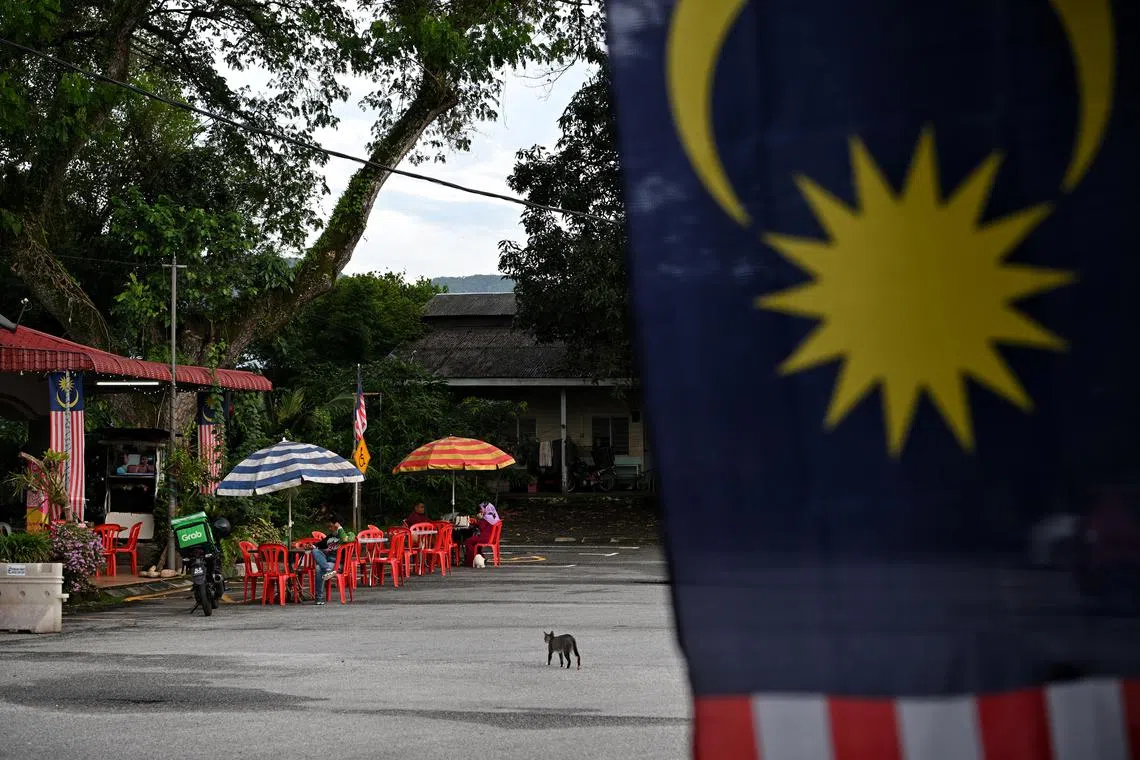Status quo: Malaysia’s pork-free, booze-free eateries don’t need halal certification, says DPM Zahid
Sign up now: Get insights on the biggest stories in Malaysia

Controversy erupted over a plan to make the requirement compulsory for outlets that do not serve pork or alcohol.
ST PHOTO: KUA CHEE SIONG
KUALA LUMPUR – Getting halal certification will remain optional for Malaysia’s eateries, said Deputy Prime Minister Zahid Hamidi on Sept 18, after controversy erupted over a plan to make the requirement compulsory for outlets that do not serve pork or alcohol.
“After deliberation, the Cabinet agreed to maintain status quo” for halal certification, Datuk Seri Zahid said in a statement to the media at the Global Halal Summit 2024 in Kuala Lumpur. For Malaysia’s Islamic Development Department (Jakim), the issuance of halal certification has been voluntary since its introduction in 1974, he added.
The Muslim-majority country issues halal certificates, which guarantee that the supply chain and products of a business comply with Islamic law and are safe for Muslims’ consumption, or halal. This includes ensuring that the products and premises are free of pork and alcohol, which are haram, or forbidden in Islam.
Some restaurants choose to be pork-free and alcohol-free to attract a wider clientele, but stop short of being certified as halal, a stringent process that can take months.
According to Jakim, which is in charge of the certification, businesses pay fees ranging from RM100 (S$30) to RM10,000 yearly, depending on the sector and ownership status.
It takes 30 days to process an application. But in reality, the waiting time can be far longer as applicants must ensure that all ingredients used are 100 per cent halal-certified, C&J Food Group managing director Oo Kok Cian, who has 10 years of experience in food safety and the halal consultancy business, told The Straits Times.
“For example, a (food) outlet may have 100 (menu) items. Each item has 100 ingredients. There are some instances where 20 ingredients had their halal certification expired. The applicant needs time to find other halal-certified suppliers or risk their application being rejected before going through (the) audit (process),” he explained.
Critics of mandatory halal certification say that forcing Muslim-friendly eateries to obtain halal status places an undue burden on businesses, infringes on consumers’ right to choose and goes against Malaysia’s multicultural values.
Earlier on Sept 18, Minister in the Prime Minister’s Department (Religious Affairs) Mohd Na’im Moktar presented a report to the Cabinet to discuss the proposed plan to make halal certification mandatory for all Muslim-friendly eateries.
Those eateries do not serve pork or alcohol but not all of them will receive halal certification from Jakim if they apply due to strict rules.
The requirement became a controversy earlier in September after the proposal was criticised by veteran MP Teresa Kok from the Democratic Action Party (DAP), which is part of the ruling coalition Pakatan Harapan (PH).
Ms Kok claimed on Sept 6 that besides increasing the burden on businesses, infringing on consumers’ choice and being against multiculturalism, the Jakim proposal could “embarrass Malaysia on the international level”. On Sept 14, she admitted that this statement was a mistranslation from Chinese to Malay by ChatGPT.
Her remarks drew a spirited response from Umno, an allied party in the government, with its youth chief, Dr Akmal Salleh, saying that Ms Kok, a non-Muslim, should not interfere in Islamic matters.
Distancing himself from Ms Kok’s statement, Prime Minister Anwar Ibrahim suggested that the veteran parliamentarian should use internal channels to express her concerns rather than cause unnecessary public controversy.
Since the 2022 general election
Opposition parties have taken the opportunity to further undermine the ruling alliance’s support.
Parti Islam SeMalaysia president Abdul Hadi Awang alluded to the “weak” Malay-Muslim government leaders who cannot handle non-Muslim demands. On Sept 14, the nomination day for the upcoming Mahkota by-election in southern Johor state, a handful of supporters of its coalition partner, Parti Pribumi Bersatu Malaysia, displayed “Dijamin Halal” (Guaranteed Halal) banners.
Meanwhile, political observers welcome the decision to maintain the status quo.
Mandating all Muslim-friendly restaurants to obtain halal certification could lead to a backlash, said Mr Phoon Wing Keong, head of Huayan Policy Institute, a centre for Malaysian-Chinese studies.
“Besides backlash from the Chinese and Indian communities, (the move) will also invite criticism from East Malaysia, creating disruptions for the Muslim (food businesses) which do not have certification,” he told ST.
The issue has also stirred up negative publicity for businesses popular with the Malay-Muslim community. On Sept 3, Jakim said Muslim-friendly eateries Johnny’s Restaurant, Black Canyon, Dolly Dim Sum, Mr Dakgalbi and Bungkus Kaw Kaw were not in its database of halal-certified restaurants.
In response, Dolly Dim Sum clarified that its central kitchen, which supplies ingredients and semi-prepared food to all its branches, is halal-certified and the company is in the process of obtaining halal certification for its branches. Johnny’s Restaurant and Black Canyon have said they source their ingredients from halal-certified suppliers.
Malaysia’s halal industry, which includes the food and beverage sector, cosmetics and personal care, and pharmaceutical products, is projected to grow to US$113.2 billion (S$146 billion) in 2030
The lucrative halal market has attracted business from Malaysia’s non-Malay Muslim communities – mainly Chinese and Indians.
In July, Mr Zahid – who chairs the Halal Industry Development Council – told Parliament that 60.4 per cent of Jakim-certified halal companies are not bumiputera-owned, while 39.4 per cent are owned by bumiputeras. Bumiputeras refer to Malays and the Orang Asli in peninsular Malaysia as well as indigenous groups in Sabah and Sarawak.
According to the Ministry of International Trade and Industry, Malaysia’s halal exports continued its growth trajectory in 2022, with a total export value of RM59.46 billion, up RM23.16 billion or 63.8 per cent from the previous year.
By sector, food and beverages remained the biggest contributor to the Malaysian halal economy, with RM27.84 billion in total export value in 2022, representing 46.8 per cent of all Malaysian halal exports.
The second-largest contributor was halal ingredients, with total export value of RM23.35 billion in 2022, or 39.3 per cent of Malaysia’s total halal exports.



